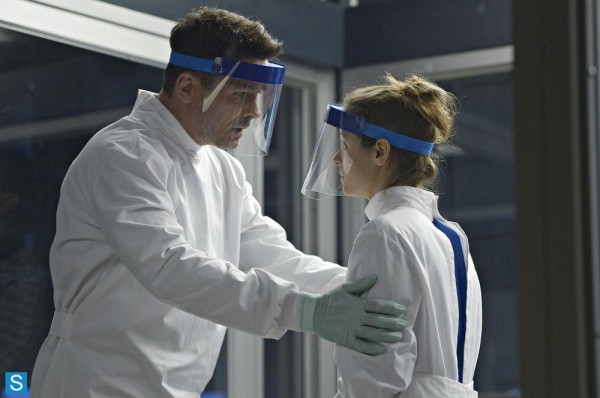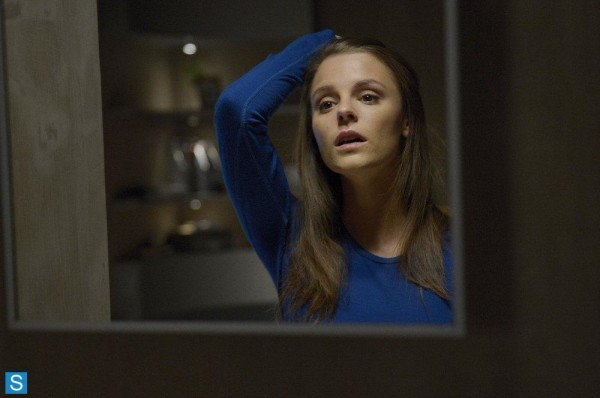
Courtesy of Syfy
The year’s worst new show continues to trot along. Can anything redeem this festering turd?
Let’s bitch it out…The short answer is no.
At this point, four episodes in, Helix has proven to be remarkably consistent in terms of pacing, characterization and aesthetic. This would be commendable if these characteristics were worth celebrating, but they’re not. It seems as though Helix knows what kind of show it is and stays true to that. The problem is that it’s staying true to being a bad show.
All of the problems that TVAngie discussed in the first two episodes and I parroted last week remain applicable in this fourth episode. Characters continue to make stupid decisions (I’m looking at you, Doreen!) and all of the non-CDC scientists are jackasses who don’t give a shit about anyone’s welfare but their own. Meanwhile Hatake (Hiroyuki Sanada) continues to be riddle wrapped in a mystery inside an enigma, albeit not a particularly interesting one. Glowing eyes and a propensity to avoid questions does not a memorable character make.
So that basically leaves us with Alan Faraday (Billy Campbell) and his CDC co-workers. God help us, because they are a bland bunch. Alan spends the entire episode at Peter’s (Neil Napier) bedside, reminiscing about their terrible childhood in between administering doses of the mysterious universal anti-virus (which appears to work…and then doesn’t. Someone look up the definition of anticlimatic).
Things aren’t much more interesting with Sarah (Jordan Hayes) who initially appears to be infected, but is actually revealed to have a tumour (because why not?). Frankly I don’t care, at least not until it impacts the narrative. The moment the tumour becomes a blackmail opportunity for the infected lady doc, I want it gone. Thankfully it inspires the most realistic interaction of the episode (and possibly the series): after Sarah learns that her test doesn’t work, she visits Alan. Naturally Peter recovers at the exact moment that she’s about to confess and it looks as though she won’t tell Alan so that he can savour the moment (It’s at this point that I almost threw my glass at the TV). And then – miracle of miracles – Sarah steps over to Alan and makes her confession anyways. Hurray, that’s what a real scientist would do! Of course, any and all excitement ends there as Alan suggests she tell Hatake and simply re-test everyone as though her words aren’t a huge revelation that changes everything. Well at least for one single shining moment a character on this show had a genuine reaction.
That leaves us with Julia (Kyra Zagorsky). The only infected member of the CDC (that we know of) is isolated down in Level R – literally isolated actually. The other infected doctors lock her out when she challenges their plan to shut off the oxygen scrubbers and deprive the base of air (don’t even get me started on that). It’s clear that Julia’s story is meant to be the most mysterious of all plotlines. Between Peter and Hitake’s obsession with her and the new revelation of her childhood signature on a random wall, everything about Julia is clearly meant to evoke a WTF?! response. I don’t buy it. It seems to me that Julia is simply suffering from symptoms of the virus (ie: hallucinations); I also don’t believe that Jaye (Amber Goldfarb), the mysterious gas mask lady, is real (she disappears the first time that Julia sees her and seems to conveniently know everything Julia needs). If I’m reading it correctly, then Julia is well on her way to crazy town.

Courtesy of Syfy
Other Observations:
- As predicted, Balleseros (Mark Ghanimé) kills Doreen (Catherine Lemieux) when she learns the truth about the virus. We all knew it was coming because Doreen was the only interesting character on the series, so naturally she had to go.
- Is Balleseros really Black Ops for the Pentagon? That part rang true and yet clearly Balleseros has a shady agenda that doesn’t gel with those of a typical government agent.
- Were we not meant to know that the virus was artificially constructed? ‘Cause it seems kinda obvious.
- Just before her death Doreen suggests the virus is designed to change people from the inside out. “To what?” is likely going to be the defining question for the series.
- Similarly, is anyone surprised when Hatake kills the insurgents after promising to work with them? Everyone in this episode comments on how Hatake will let them die. When he engineers his employees’ deaths, it simply feels like the all the groundwork that’s been laid out coming to fruition.
- I love that the lack of oxygen should be the main problem in this episode and yet no one addresses it. It seems like every once in a while the writers pull their heads out of their butts and give Nathaniel (Meegwun Fairbrother) or Hatake a line about it, but aside from that, it doesn’t feel pressing at all. It’s just oxygen, right?!
- Peter recovers, then expires and is now currently being kept alive on life support. Anyone wanna bet that he springs back in the future?
- Finally, I love the moment that Peter truthbombs Alan about how hooking up with Julia on the regular. If you only had a few minutes of lucidity to talk to your brother, why not stab him in the front repeatedly? I know I would. But then again, how else can the writers keep this lame love triangle alive otherwise?
Over to you: Is Julia hallucinating? Is Sarah’s tumour going to kill her before the virus? Were you surprised that Doreen died? Will Peter rise again? And are we any closer to discovering Hatake’s agenda? Comment away below.
Helix airs Fridays at 10pm EST on Syfy. At this point I’m not sure I have the mental stability to handle this show’s stupidity anymore, so I’m bowing out of regular coverage. I may check back in around finale time if anything worthwhile occurs. With this show, don’t hold your breath!
That’s bad considering up until this point they are no closer finding a cure then they have been since the beginning and that’s even if they had all the answers, which they don’t. Dr. Hatake (Hiroyuki Sanada) along with his minion from the U.S. Army, Balleseros (Mark Ghanime), are doing a very good job of keeping secrets from the CDC team by covering their tracks with infected monkeys, not giving the team access to all the information and the biggest thing to date by blowing up the communication array leaving them cut off from the rest of the world.